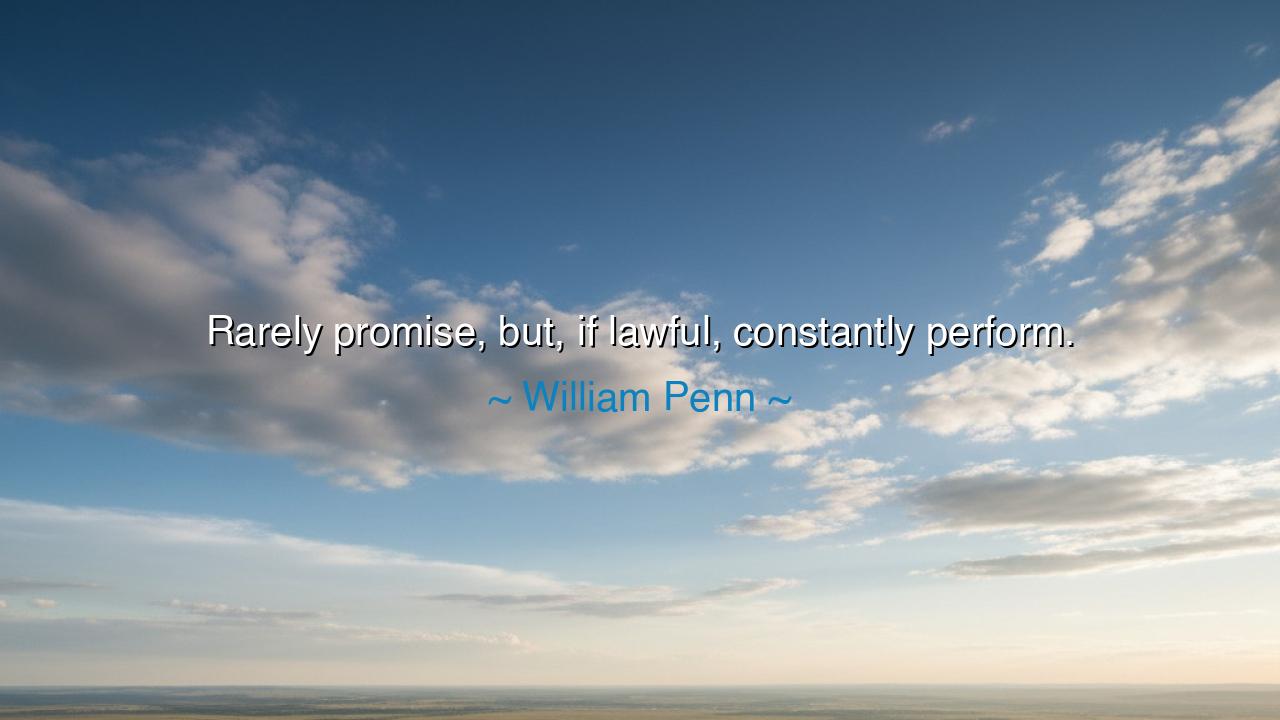
Rarely promise, but, if lawful, constantly perform.






The noble founder and visionary William Penn, a man who sought to build a society rooted in harmony and justice, once declared: “Rarely promise, but, if lawful, constantly perform.” These words are a guiding star for all who seek to live with honor. They teach that a promise is not a mere arrangement of words, but a sacred bond, binding the speaker’s soul to action. To make promises lightly is to treat truth as a trinket, yet to fulfill them steadfastly is to stand as a pillar of integrity amidst the storms of life.
To rarely promise is an act of wisdom and humility. Many speak boldly of what they will do, eager to win favor or admiration. Yet such words are like arrows loosed carelessly, bringing harm when they cannot be fulfilled. A wise person guards their tongue, offering their word only when the path is clear and righteous. For a false or broken promise is not merely a personal failing—it breeds mistrust, poisons relationships, and diminishes the speaker’s very spirit.
But when one does give their word, Penn commands that they must constantly perform. To act with unwavering faithfulness is to transform a promise into a beacon of hope and stability. History is shaped by those who kept their commitments, even at great personal cost. Consider George Washington, who endured bitter winters and crushing defeats during the American Revolution. He promised his men liberty and victory, and through tireless effort and unshaken resolve, he fulfilled that vow. His steadfastness turned the fragile dream of independence into a living nation.
By contrast, history also offers grim warnings of leaders who promised greatly but failed to deliver. The fall of Louis XVI during the French Revolution was hastened by broken assurances to his people. His words of reform rang hollow as his actions faltered, and the trust between ruler and subjects dissolved into rage. His fate shows that promises unfulfilled can ignite the fires of rebellion and bring down even the mightiest throne.
Let this teaching be carried through the generations: speak with care, act with constancy. When you rarely promise, your word gains weight, and when you constantly perform, your character becomes unshakable. Such a life builds bonds of trust that no storm can break. As William Penn teaches, the true measure of honor lies not in the grandeur of one’s words, but in the steadfastness of one’s deeds. A single fulfilled promise is worth more than a thousand empty vows, and through it, the world is made whole.






BCBi Cutii
I think this quote is a reminder of the power of our word. It speaks to integrity, but it also makes me wonder: is it more important to only make promises we can absolutely keep, or should we be open to stretching ourselves to deliver on promises? Could the essence of this quote also encourage a focus on not overcommitting ourselves, learning to say no, and recognizing when a promise is too much?
HDHao Duc
William Penn’s quote highlights the importance of action over words, but I wonder if it’s possible to live up to this principle all the time. Sometimes life just doesn’t go as planned, and we find ourselves unable to meet even our best intentions. How do we ensure that we are performing consistently without overburdening ourselves? Could it also mean that we need to be mindful of the promises we make in the first place?
GDGold D.dragon
This quote feels like it encourages a minimalist approach to promises, which makes sense, especially in a world where people overpromise and underdeliver. But can promising less sometimes result in missed opportunities? If you’re too cautious about making promises, could you unintentionally limit yourself or others? It seems like there’s a balance between being cautious with promises and being open to commitments that can create positive change.
HMNguyen hoang minn
I really appreciate this quote because it speaks to the value of reliability and integrity. It makes me wonder, though—what happens when we make promises in good faith but are later unable to keep them due to circumstances beyond our control? Should we still feel guilty about not fulfilling them? And does this quote suggest that we should only promise things we are 100% certain we can follow through on?